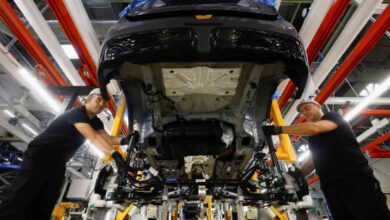Czechs wipe out loan sharks to help tackle inequality
Radek Hábl quit his job in finance and set up a team of experts focused on debt relief after his cousin asked for a loan of the equivalent of 4,000 euros.
“I was ready to help her, but first I wanted to understand her problem,” said Hábl. “So we listed all her debts and loan sharks, and it showed that not only was she in a terrible spiral, but she was also a victim of a huge, unmanaged debt enterprise that we should never have allowed to grow.”
Under the Czech Republic’s post-communist debt laws, loan sharks have the power to impose exorbitant late payment penalties, freeze debtors’ bank accounts or cut off electricity without a court ruling.
“These laws are written by a small group of lawyers who see collecting unpaid debts as a quick way to become very, very rich, even if it creates a social crisis,” said Hábl, who founded the Institute for Debt Prevention and Resolution in 2019.
But after a campaign by Hábl and other grassroots activists, lawmakers acted on a debt trap that once affected one in 10 Czechs. A series of measures since the start of the decade have set Czech Republic is on its way from a country with a major debt problem to one with the lowest debt levels in Europe.


Breaking the stranglehold of personal debt has brought broader benefits to society, from keeping the labor market going to ensuring children can complete their education rather than being forced out early by their parents to earn money. The reforms have helped make the central European nation of 10.5 million a beacon of financial and economic equality.
The Czech Republic’s unemployment rate is 2.7 percent, the lowest in the EU, and its poverty rate is 12 percent, also the lowest — nearly half the EU average of 21.4 percent, according to Eurostat. data on the risk of poverty and social exclusion.
The country also has one of the best records in Europe on inequality, as measured by the standard Gini coefficient.
Grassroots activists began by collecting data on asset forfeiture requests, helping to highlight the crisis and convince lawmakers to curb police powers.
While lawmakers tighten controls on these debt collectors, the Czech parliament has agreed in 2021 to declare a “summer of leniency,” in which people can pay off the principal of some state debts and in return have interest and other fees forgiven.
The finance ministry collected 400 million CZK ($18 million) during the three months of “mercy” and wrote off 1.5 billion CZK of additional debt for public services, from court fees to municipal housing taxes and waste collection taxes. With some adjustments, the mercy program continues to be implemented annually.

Separately, a new regulation passed by Congress in May this year will shorten the time that debt relief applicants have to repay the minimum monthly amount after declaring bankruptcy.
Some Czech debt laws have also been changed to comply with EU law.
However, some local economists warn that Eurostat is overstating the financial strength of Czech society by calculating the poverty threshold at 60% of median income.
“Simply put, because we are generally low income, there are relatively few households that fall below that threshold,” said David Navrátil, head of research at Erste Group’s Czech subsidiary Česká Spořitelna.
Navrátil and others also note that the EU statistics agency’s figures do not account for asset seizures and rely on surveys with response rates of around 50 percent. These likely exclude many people in extreme poverty, from the homeless to members of marginalized communities like the country’s Roma population.


Eva Zamrazilová, deputy governor of the Czech central bank, wants to do more to curb predatory non-bank intermediaries, as well as help borrowers understand their debt protection rights. “While legislation may have improved, financial literacy has not improved, despite the great efforts of many private and public sector organizations,” she said.
These measures also failed to eliminate significant differences between Czech regions, especially between the wealthy capital Prague and poorer surrounding cities such as Kladno.
Kladno’s coal and steel output, which powered the country’s industrial revolution, has all but evaporated since the 1990s.
While factories and warehouses run by Lego, Amazon and two Czech bakery groups provide jobs, the many shuttered shops on the main street, as well as a number of discount and second-hand clothing stores, mean local consumers have little money to spend. Some of Kladno’s 70,000 residents also live in abandoned homes, including many Roma families.


For the past two years, Sabina Kešelová, 24, who lives with seven other relatives at her parents’ house in Kladno, has struggled after taking out a 200,000 CZK bank loan to pay for driving lessons and buy a used car.
Soon after buying the car, she lost her job at the factory and had to repair the car’s engine, forcing her to stop paying the loan. Penalties and interest mean she now owes 500,000 CZK and is considering declaring bankruptcy, as “my ability to pay this back is getting lower and lower”.
Kešelová is now seeking help from one of the country’s largest charities, People in Need, which has 60 staff in Kladno and the surrounding Bohemia region, including 12 who specialise in debt relief.
“Laws have improved and Czech society is more open to discussing debt, which was previously considered shameful,” said Jana Odvárková, who works for People in Need in the city. “But when you look at our work here, it shows that EU statistics do not tell the whole story and that we, the Czechs, are probably still number one in hiding some of our problems.”
Data Visualization by Keith Fray





